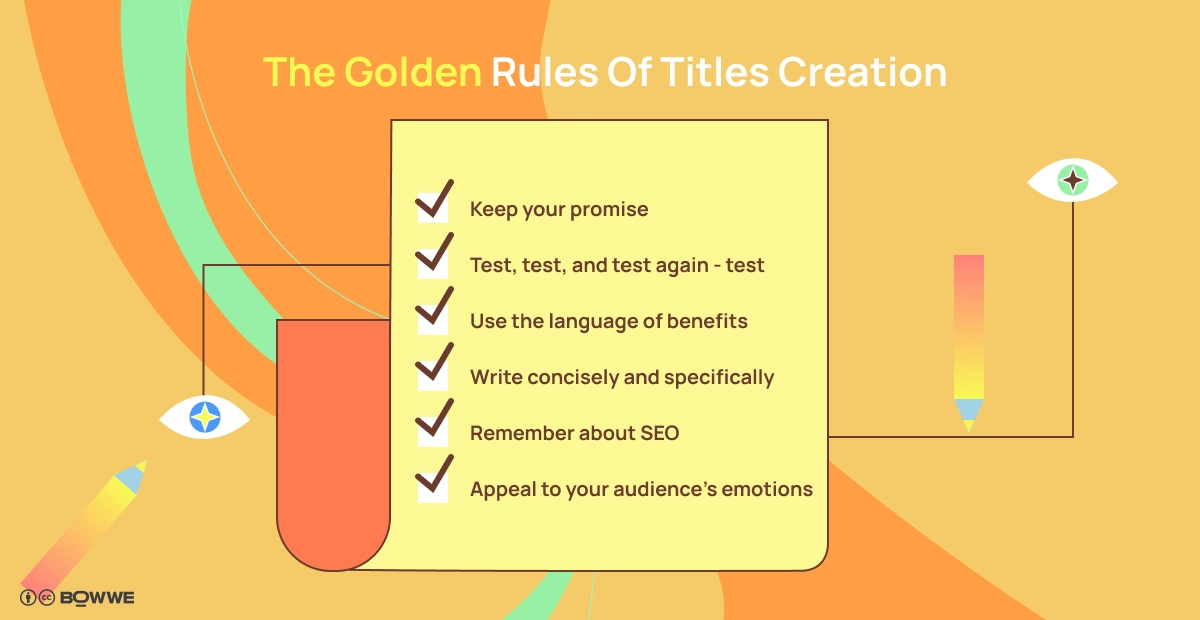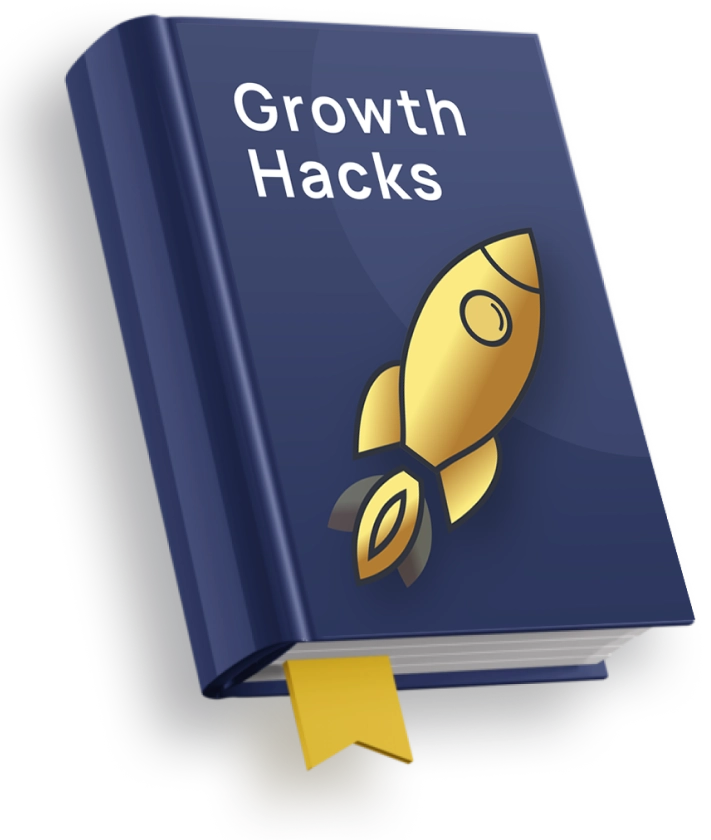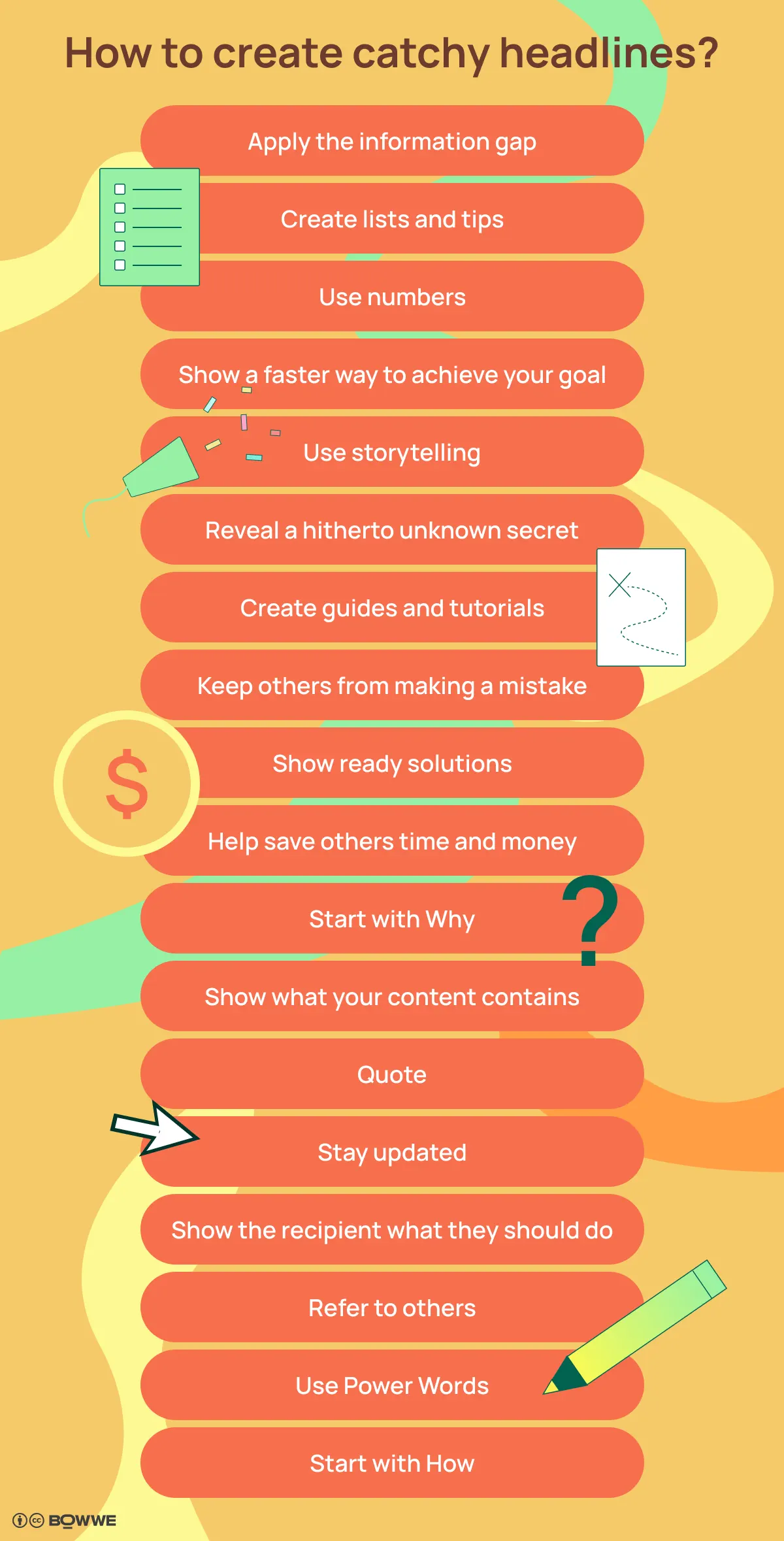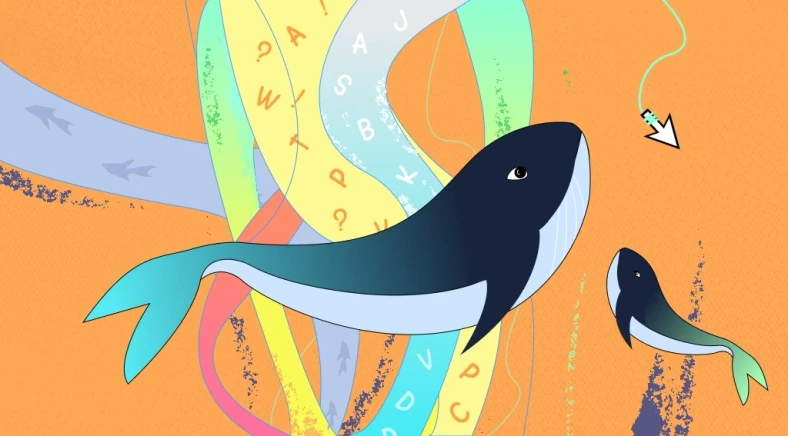Did you know that 8 out of 10 Internet users only share articles after reading the title itself?
The headline draws the user's attention the most and makes them want to click on the content. A catchy title is an absolute foundation for every article - that's why we've put together some proven ways to build your headlines for you. With these proven techniques, you can easily create a compelling headline for any content.
Are you aware that a staggering 80% of internet users only share articles after being captivated by their titles? Without a doubt, the headline is the most crucial element of any content, as it is what entices the reader to click and explore further.
Crafting a captivating title is paramount to the success of your article, and I’m here to equip you with 17+ tried-and-true techniques to create headlines that grab attention and drive traffic. Utilizing these proven methods, you can effortlessly compose headlines that will leave a lasting impression on your audience and take your website's traffic to new heights. Let's dive in!
Try Now!
How important is the title of the text?
What if you neglect your article headline? Well ... your text may even be the most interesting in the world ... but what if no one reads it? A compelling title is meant to raise the reader's interest and make him read the rest of the content. You absolutely must remember this!
Crafting a catchy title. Where to begin?
Writing a compelling title isn't always a walk in the park and may even demand a considerable amount of your time. But fear not - there are proven ways to make this task easier and more effective.
So, how can you create a captivating title that drives the highest traffic to your website? The first step is to ask yourself a few critical questions.
- What topics are your target audience interested in, and what knowledge do they crave?
- Is there a gap between what they know and what they want to know, and can you fill that gap with your content?
By answering these questions, you'll be well on your way to crafting a title that not only grabs attention but also delivers value to your audience.

How to create titles?
No matter what title you want to create, it's a good idea to stick to these 6 basic rules:
How to create titles?
- Fulfill with a promise
- Test different variants
- Use the language of benefits
- Write concisely and specifically
- Remember about SEO
- Appeal to the emotions of your audience
1. Keep your promise
2.Test, test, and test again - test
Create several versions of one title. The first thought in creating a headline may not always be the best one. A good headline needs to be analyzed. Having several variants to choose from will make it easier for you to choose the perfect one. You can also try A / B test and change the titles from time to time even after the text is published. Thanks to the statistics from analytical tools, you will find out which title brings better results. Use different techniques of persuasion and choose different keywords. See what works for your audience and what search engines like. Remember that there is no single recipe for a successful headline for every article. Choose a formula that reflects the nature of your text.
3. Use the language of benefits
Use your title to tell the users what they will gain from reading the article. Use the information gap and include interesting facts or specialist knowledge in the article. It is worth sharing your own experience - this will make your article unique. Revealing secrets in the form of a case study or a guide based on your own experience will undoubtedly be perceived by your users as valuable.
4. Write concisely and specifically
The catchy headline should be short. It's best if you can fit in 70 characters with spaces. It is also essential in terms of positioning. Search engines will not display the full title if you exceed the maximum of 600 pixels. The more extended title will be cut off and thus will lose the original message and power of persuasion.
5. Remember about SEO
The title is the perfect place to put your keywords. Choose the most important keywords that define your industry or are closely related to the article's topic. Use free keyword planning tools for this. However, remember not to overdo it with the number of keywords in the header. Otherwise, you'll get an effect keyword stuffing that looks unnatural.
BOWWE Growth Hack
Use long-tail phrases. Extended terms are more unique - with their help, you can describe the problem in detail. It can be difficult for you to break through the competition in search engine rankings with really popular single keywords.
6. Appeal to your audience's emotions.
Use language that will touch your readers' emotions. Instead of referring to the facts themselves, express your enthusiasm in words (Learn SEO basics easily - it's possible). Personalize your title and address the recipient directly, preferably you. Formal phrases can be dissuasive, while too general, impersonal phrases will lose their force in the message.
Start Building
No coding experience required.
17+ proven patterns for building catchy titles
Are you struggling to create headlines that grab your readers' attention and leave them wanting more? Do you find yourself staring at a blank page, searching for inspiration and ideas?
Don’t worry because copywriting formulas are here to save the day! These powerful writing techniques have been used by copywriters and marketing gurus for years, and for a good reason. They are incredibly versatile and can be adapted to fit almost any type of content. Simply input your topic into one of these formulas, and voila - a captivating headline is born.
So, what are you waiting for? Let's dive into the world of copywriting formulas and discover the secret to crafting titles that will drive traffic to your website and keep your readers engaged.
How to create catchy headlines?
- Apply the information gap
- Create lists and tips
- Use numbers
- Start with How
- Show a faster way to achieve your goal
- Use storytelling
- Reveal a hitherto unknown secret
- Create guides and tutorials
- Keep others from making a mistake
- Show ready solutions
- Help save others time and money
- Start with Why
- Show what your content contains
- Quote
- Stay updated
- Show the recipient what they should do
- Refer to others
- Use Power Words
1. Apply the information gap
Have you ever heard of the curiosity gap? It's the gap between what we know and what we can know. Whenever our mind encounters incomplete information, we experience this gap. Our natural instinct is to satisfy our curiosity and quickly fill in the missing pieces.
As a content creator, you can leverage this information gap to ignite the reader's thirst for knowledge. And the best way to do this is through a captivating title! By withholding essential details in the headline, you can create an untold story that entices readers to click and explore further. This approach works particularly well when the topic addresses the reader's personal situation and provides valuable insights.
So, how can you create an information gap with a title? Here are some examples to inspire you:
- Revealed: The Shocking Cost of Hiring a New Employee
- Is Your Profession Among the Top Gainers in Today's Job Market?
- Brace Yourself: The Unstoppable Rise in Price of Your Favorite Smartphone
- By using these tried-and-tested techniques, you can create titles that engage readers and drive traffic to your content.
Curiosity gap vs. clickbait
It's crucial to distinguish the curiosity gap from clickbait. Unlike clickbait, which manipulates readers' emotions and lures them into clicking a title by making false promises, the curiosity gap technique piques readers' interest without misleading them.
Clickbait often leaves readers disappointed as the article fails to deliver the promised value. Such poor quality content can trigger readers' fury, and this tactic is frequently employed by gossip websites to increase clicks.
2. Create lists, guides, and tips
One of the most effective ways to write an engaging article is to transform it into a list of practical tips, inspirations, or a checklist.
By dividing the content into easy-to-follow steps or sub-items, you can create a specific hierarchy that organizes the text and makes it easier to read. This approach not only makes the content clear and understandable for the reader but also makes it easier for you to write.
Furthermore, listed texts tend to go viral and increase the chances that readers will choose this type of article. This is because they provide a guarantee that the reader will find specific information in the article rather than having to sift through a massive amount of text.
Additionally, listed texts allow readers to quickly scan the article during a short break at work and find the most exciting information.
3. Use numbers

Looking to attract more eyeballs to your content? Consider using numbers in your title - they're a proven tactic that can draw in readers with their numerical structure. By starting your title with a number, you can make it stand out from the crowd of letter-based titles out there.
For maximum impact, try using odd numbers - they're more attention-grabbing than even ones. Instead of the tired and true "5" or "10" ways to do something, go for something like "7 secrets to skyrocket your website traffic".
Need some inspiration? Here are a few examples of compelling number-based titles:
- 6 must-visit destinations in Italy that will leave you breathless
- 8 steps to building the perfect website, even if you're not a tech expert
- 11 creative ideas for writing articles that readers can't resist
4. Start with the How
When searching for information, people typically use the word "How" to formulate their queries. By incorporating this word into your title, you can pique the reader's interest and guarantee the popularity of your content.
If your article is a tutorial or you're sharing your experience, starting your title with "How" suggests that your text contains the answer to a specific question. The beauty of this technique lies in its directness, as the reader expects a clear and concise solution. However, it's important to deliver on your promise and provide the reader with the answer they're seeking.
Consider these examples:
- How to Effectively Stay in Shape After Losing Weight
- How to Create Engaging Blog Content When You're Not an Expert
- How to Earn Your First Blogging Income
But don't limit yourself to just "How" questions. You can also turn your title into any other thought-provoking question, like:
- At What Age is it Best to Launch Your Own Business?
- Should You Combine Work and Passion for More Income?
- What Are the Traits of the Best Project Managers?
5. A faster way to achieve a goal
As humans, we crave fast and impressive results with minimal effort, and this holds true for online content as well. To captivate your audience and encourage them to take action, it's crucial to provide them with intelligent solutions, tutorials, or beginner's guides that can expedite their progress. Crafting titles that offer shortcuts is an effective way to do this, and here are some proven examples:
- Start Your Own Blog in Just a Month
- Increase Your Earnings with Only 5 Hours of Work Daily
- Master Coding by Practicing for Just an Hour a Day
6. Storytelling

There's nothing that resonates more with readers than authenticity. And what better way to achieve that than by telling a captivating story or sharing a personal experience?
Incorporating storytelling into your content can work wonders, whether you're writing an article or a case study. To create an effective title, try using this formula: "How did we get there" or "How I did it."
Check out these examples to get an idea of what we're talking about:
- "Here's How We Developed an App Prototype in Just 3 Weeks"
- "How I Transformed My Qualifications and Became a Programmer at 50"
- "From a Garage Computer to the Most Valuable Company in the World: The Story of Apple"
If you want to boost your traffic to the next level, consider using these proven techniques to create captivating titles.
7. Reveal an unknown secret
Unlock exclusive knowledge and make your readers feel special with these proven techniques. Everyone loves a good mystery, and by sharing insider secrets from successful companies, such as cracking the Google algorithm for more effective positioning, you'll keep your readers hooked.
- "7 Sins No Manager Will Confess"
- "Biggest Corruption Scandals in History"
- "How to Write an Article to Alienate Everyone? The Biggest Mistakes of Copywriters"
These attention-grabbing titles will help you achieve the highest traffic and keep your readers coming back for more.
8. Create guides, tutorials
One effective way to create engaging titles is to provide clear and helpful instructions on how to do or use something. Guides can take many forms, including articles, videos, or infographics, and can establish you as an expert in your field. Updating them is also a breeze, as you can simply add new threads to keep them fresh and relevant.
- Ahrefs' Mega Guide: Effective Competition Analysis
- The Indispensable Guide to Uploading Your First YouTube Video
- Whip Up Your First Course in Just 15 Minutes with This Simple Mixer Instruction Manual
Another effective approach is to use the "How..." formula to offer a ready solution to users' problems. For instance:
- How to Create a Portfolio Even Without Much Experience: A Step-by-Step Guide
- How to Start Coding from Scratch: A Comprehensive Tutorial
With these tips and tricks, you'll be well on your way to crafting irresistible titles that will drive traffic to your site and establish your authority in your niche.
Start Building
No coding experience required.
9. Protect others from making a mistake
Making mistakes can be costly, which is why we all want to learn from those who have more experience. Be the wise mentor for your audience by sharing your knowledge and advising them on what to avoid. By imparting your expertise, you can help them achieve their highest traffic goals.
Some title examples to inspire you:
- Don't make these 9 common copywriting mistakes – learn from the pros
- Wedding planning disasters: Top mistakes to avoid at all costs!
- How to outsmart hackers: Tips and tricks to keep your website safe
10. Show solutions
It's important to remember that your title should offer value to your readers. By providing them with advice that can simplify their lives or save them time, you're more likely to capture their attention. Make sure to highlight the specific benefits that your solution can provide, such as a six-pack in six weeks or getting rid of greasy stains in just four steps.
Another key factor in crafting an irresistible title is to make it sound achievable. People love shortcuts, so if you can promise success with minimal effort, you'll instantly pique their interest. Just be careful not to over-promise or suggest something that's impossible to achieve in a short amount of time.
- The Ultimate Guide to Achieving a Six-Pack in Just Six Weeks!
- Say Goodbye to Greasy Stains: Four Proven Ways to Keep Your Clothes Looking Fresh
11. Save others time and money

In the world of product and solution options, there's always room for improvement. It's crucial to present your audience with the most advantageous alternatives to save their time and money. It's time to show them that they're not stuck with just one solution. Adding descriptive adjectives like "free," "fast," and "cheap" can help attract them even more.
Check out these captivating titles that will surely attract your audience and increase your traffic:
- Unleash your creativity with a free Photoshop alternative!
- Don't have the budget for a social media specialist? Discover practical content tweaking tools!
- Are influencers' favorite powders too pricey? Try this cheap and effective alternative!
12. Start with Why
Give your recipient a question that accurately reflects their doubts and answer them satisfactorily way. This solution also gives a chance to appear in recommended fragments (features snippets) from Google.
Recommended fragments (featured snippets)
These are fragments of the website that correspond in the best way (according to Google) to the entered query in the search engine. They should not be confused with paid advertising. Google selects the fragments that best fit the query itself. They can be in the form of a list, answer to a question, instructions, etc.

Search for a phrase "featured snippets"
To write a captivating title that attracts maximum traffic, it's important to pose a question that reflects the reader's doubts and provides a satisfactory answer. Here are some examples of attention-grabbing titles that utilize this technique:
- Why is the grass green? Unveiling the Science Behind Nature's Color Palette
- Why should you take out health insurance even if you have never been seriously ill? Exploring the Importance of Preemptive Health Measures
- Why is it worth saving money? List of the most important benefits that you never thought of
Alternatively, you can use similar word combinations to pose intriguing questions in your title. Here are some more examples:
- What are the top secrets of successful entrepreneurs? Lessons from the World's Top Business Leaders
- How to create an SEO strategy that will skyrocket your website's ranking? A Step-by-Step Guide to Mastering SEO
- Where can you find the best travel deals in 2023? Insider Tips for Budget-Friendly Travel
13. Show what your content contains
When it comes to writing captivating titles, there are plenty of proven techniques that can help you stand out in the crowded online space. One such technique is to highlight unique elements of your content, such as an interview or a photo gallery, in the title itself.
Another effective strategy is to promote additional resources or content, such as downloadable PDFs, right in the title.
By doing so, you'll be able to entice readers with valuable information and resources, increasing your chances of driving more traffic to your site.
Check out these examples of captivating titles that utilize these proven techniques:
- "How to Slash Your Daily Calorie Intake: Our Expert Tips and Tricks [+ Table]"
- "Discover the Hottest Reads of the Year: Vote in Our TOP 10 Books Poll"
- "Exclusive Behind-the-Scenes Look: Our Photo Report from the 2023 Oscars"
Start Building
No coding experience required.
14. Quote
Incorporate an intriguing quote from an interview or conversation. By doing so, you'll grab your audience's attention and pique their curiosity.
Need some inspiration? Check out these examples:
- "I've always felt this was the right way." - Katy Perry reveals her secrets to success
- Expert opinion: "Social Media is bad for children's mental health" - What you need to know
- James Oliver on the growing popularity of Asian cuisine: "It should have happened a long time ago"
Remember to choose quotes wisely - they should be concise and add value to the title. With this technique, you'll be one step closer to achieving your highest traffic yet!
15. Stay informed
Add the current year to your title when creating tutorials, guides, or summaries. This not only adds a sense of urgency but also signals to your readers that the information is fresh and relevant.
Check out these examples of captivating titles that use this technique:
- Ahrefs Competitor Analysis: The Ultimate Guide (2023 Edition)
- What's On: The Top Events in Warsaw for June and July 2023
- Fashion Forecast: The 10 Trends That Will Dominate in 2023
By incorporating this easy hack, you'll be on your way to creating titles that grab attention, pique curiosity, and drive traffic to your content.
16. Tell your audience what they should do
A winning title should not only command action but also promise a reward. To achieve this, your title should be clear, concise, and compelling.
Use power words that create a sense of urgency and excitement, such as "proven," "ultimate," or "exclusive." Don't be afraid to ask a question that resonates with your target audience's pain points or desires.
Here are some examples of captivating titles that follow these principles:
- Say Goodbye to Sleepless Nights: 17+ Proven Ways to Beat Insomnia
- Boost Your Website Traffic Today: Start Your Mailing Campaign with These Simple Steps
- Upgrade Your Style Game: Discover the 10 Upcoming Fashion Trends You Need to Know
17. Cite others
One strategy that works wonders is showcasing real-world success stories. By including the names of well-known figures in your niche, you can instantly boost your credibility and establish trust with your readers. Check out these examples:
- Here's how Warren Buffet made a fortune. You also can!
- Learn to sing like Beyonce! Just follow these simple rules!
But be careful not to choose famous names just for the sake of it - make sure they are truly relevant to your content and audience.
18. Use Power Words

Utilizing power words not only in your title but also throughout your content is a quick and effective way to encourage your audience to read on. However, it's essential to use these power words wisely, as not all of them will fit your niche. You can even include several power words in one title to make it even more compelling!
Here are some examples of winning titles that utilize power words:
- Discover the Ultimate Secrets to Boost Your SEO Rankings Today!
- Unleash the Untold Benefits of Social Media Marketing for Your Business
- Ignite Your Entrepreneurial Spirit with These Simple Yet Effective Strategies
- Unlock the Hidden Potential of Your E-commerce Business with These Proven Tips
Power Words
These words have the ability to stir up a range of emotions in your audience, encouraging them to take action. Categorized by feelings and moods such as greed, curiosity, laziness, lust, vanity, trust, anger, and fear, incorporating powerful words in your title can be the key to increasing engagement and conversion rates.
How to apply knowledge in practice? Check out our heading ideas!

The forms of headlines vary depending on what content they present and where they are located. They will look different in a gossip newspaper than in articles for a company blog. Therefore, always remember to adapt them to the subject of your content and your audience. Below is an example of a list of headings. Find out which category suits you best.
Shortlist of titles:
1. Titles for the website
2. Article titles
3. Blog titles
4. Newsletter titles
5. Headlines for newspapers
6. Fun titles
7. Emotional titles
8. Creative titles
9. Unique titles
10. Clever titles
11. The best titles
Website title
Website headings are an essential part of its positioning in search engines. They help organize the content and navigate through the users' side. An attractive and good headline will attract the audience and encourage them to review what the website offers. To create the proper headline for a website, SEO principles cannot be ignored. You have to remember especially about:
- Appropriate length - the title should not exceed 70 characters with spaces.
- Keywords (including those from the long tail category)
- Power Words - words that evoke emotions and encourage action
Website title example:
- Are you here for the first time? Meet BOWWE and see how to create your website without coding.
- See all configurations of our products! Choose the perfect one for you!
Article titles
Contrary to appearances, the most crucial part of an article is not its content but its title. As already mentioned, people decide to read an article based on its headline alone. This means that you actually have a few seconds and a maximum of two lines of text to attract the recipient and encourage him to read at least the introduction to your article.
Journal title ideas:
→ 8 featured free photo manipulation apps
→ What do you know about the bird world? 7 Shocking Facts You Didn't Know About
Blog titles
These types of titles are usually made of ready-made and well-known copywriting formulas. Just browse through two or three blogs to understand what they're all about. They are built according to SEO principles, matching the keywords entered in the search engine. Some of the best-known formulas for such headlines include: How…, Top [Number]…, Why… etc.
Examples of blog titles:
→ 13 ways to have a successful and romantic wedding
→ Greek salad recipe? Make her 10 minutes!
A newsletter titles
The newsletter is another form of gaining new audiences and keeping your current audience. That is why it is worth taking the time to refine each email sent as part of it. In this case, the headline is a vital element, if not the most important one. When you receive an email, you first see its title and decide whether to open it or throw it into the trash. So the title must contain attention-grabbing words that will grab your recipient's attention and convince them that it is worth reading the rest of the message.
It's also worth trying out personalized titles and using the recipient's name or recent actions on the website. Thanks to this, e-mail recipients will feel honored. You will also establish a closer relationship with them and show that you care for them.
Examples of newsletter titles:
→ Rafal, a historical moment has come and we want you to experience it with us!
→ Ania, we have something special for you. Do you want to find out?
→ A beautiful candle set for your freshly purchased table. See more proposals.
Magazine headlines
Press titles can be controversial and very sensational. This is mainly seen in gossip newspapers. The headlines are flashy, and sometimes they do not fully reflect the content they present. However, as with online titles, they must compete for the attention of the recipient. To this end, they are full of words that evoke strong emotions and contain multifunctional signs such as exclamation and question marks. They may also include excerpts from statements, e.g. from interviews.
An example of titles for magazines or newspapers:
→ Scandal! The famous singer left her dog in a hot car (Photos)
→ Only with us: Backstage of the Oscars. Watch the interview with the winners!
Funny titles
This type of headline is usually found on entertainment sites. These can be the headings of, for example, columns or movie reviews. They are supposed to amuse the recipient and convey that the rest of the content they advertise will also be equally entertaining. Fun titles can also be used on company blogs as long as they fit the way the brand itself communicates.
Examples of funny titles:
→ Very strange (but hellishly effective) ways to avoid responsibilities
→ How to quit your job in 7 steps. Instructions for the desperate!
Emotional and cute titles
You will see them most often in content that is intended for younger audiences or in content that is romantic. Children's titles need to be friendly, fun and arouse their curiosity. In the case of older recipients, they evoke strong emotions, such as emotion or delight. These are ideal for real-life stories about love or family.
Emotional and cute titles ideas:
→ Sweetness itself! Watch the latest video of cute pandas from the Korean Zoo
→ It was love at first sight. Learn the romantic history of this retired couple with 60 years of service
Creative titles
They can be found in entertainment and cultural content. In their case, they don’t always clearly indicate what, for example, a given article is about. They often contain play on words and all kinds of appeal. They are supposed to intrigue the audience and arouse their curiosity.
Examples of creative titles:
→ Water your floral business! Check out these 5 floral arrangements and get inspired
→ I promise I am combining something wrong! So I review all 7 parts of Harry Potter
Unique title
Those are impressive titles that are remarkable. They can surprise and be somewhat controversial. Their unique character intrigues viewers and promises them unique content that will not bore them. They belong to cool titles that perfectly catch the attention of the recipient.
Examples of unique titles:
→ 7 stupid things you need to do at least once in your lifetime
→ I quit social media ... and you must too!
Clever headlines
That is, titles that are often a contradiction of typical copywriting headlines. They attract recipients with their unconventional nature. They show it through a play on words or various types of references. These headlines can be risky as they don't always clear what the rest of the content they describe is about.
Examples of clever headlines:
→ Still, pouring boiling water over your tea? Stop! Now it's done like this ...
→ If you don't read this article today, you'll regret it! Don't lose this chance
Best Title
What does a good headline look like?
First of all, it must accurately reflect the problem of the audience. It is supposed to evoke emotions and encourage you to read the rest of the content presented by it. It should be consistent with SEO principles (contain keywords, Power words, and appropriate length etc.).
Here is a list of ready-made formulas for really good headlines that are effective and proven:
→ How ...
→ Why ...
→ What to do when ...
→ Top [number] ...
→ Best ways to ...
→ ... Step by step tutorial
→ [product, brand etc.] vs. [product, brand, etc.]. Comparison…

What are you waiting for? Start creating effective titles!

A good title can bring you closer to your goal, no matter what you do! You already know the appropriate copywriting formulas. Thanks to them, you will be able to create an exciting headline for any content and gain experience in the skillful use of advertising language without much effort.
What now? Choose the formula that best suits your content and start experimenting! Develop some title ideas. Then test them and watch the changes on your website. This way, you will find the perfect headline - which will give you colossal clickthrough rates!
Try Now!
Catchy titles - FAQ
What are catchy titles?
Catchy titles are titles that effectively capture the reader's attention and intrigue them enough to want to read further. They often use humor, wordplay, or emotive language to create a sense of curiosity or excitement.
How do you write a catchy title?
What are some catchy headlines?
Here are a few examples of catchy headlines:
- "10 Surprising Ways to Boost Your Website Traffic"
- "The Ultimate Guide to Social Media Marketing for Beginners"
- "How to Write a Killer Blog Post in Less Than 30 Minutes"
- "5 Simple Hacks to Double Your Email Open Rates"
- "Why Your Business Needs a Strong Online Presence Now More Than Ever"
What are some catchy headlines?
How do you write a clever headline to attract more attention?

Karol is a serial entrepreneur, e-commerce speaker m.in for the World Bank, and founder of 3 startups, as part of which he has advised several hundred companies. He was also responsible for projects of the largest financial institutions in Europe, with the smallest project being worth over €50 million.
He has two master's degrees, one in Computer Science and the other in Marketing Management, obtained during his studies in Poland and Portugal. He gained experience in Silicon Valley and while running companies in many countries, including Poland, Portugal, the United States, and Great Britain. For over ten years, he has been helping startups, financial institutions, small and medium-sized enterprises to improve their functioning through digitization.







